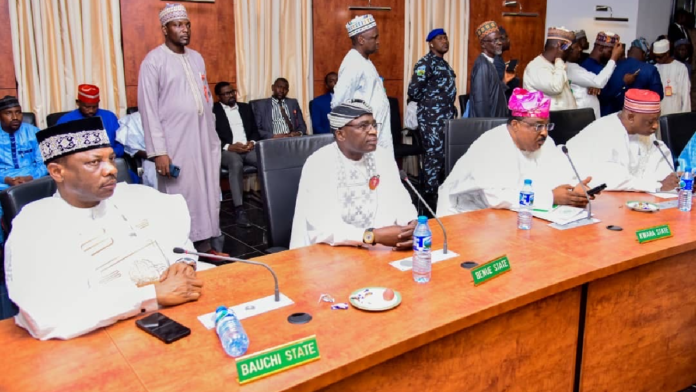The North-West Governors’ Forum (NGF) in collaboration with the United Nations Development Programme (UNDP), has mobilised the zone’s Commissioners for Women and Children’s Affairs to explore solutions to the lingering insecurity in the region.
This came to the fore at a roundtable on Thursday in Kaduna with the theme ‘Harnessing Women’s Voices For Lasting Peace’.
The Coordinator of North-West Governors’ Coordination Desk, Jibril Hamza, said the gathering focused on promoting peace and stability while strengthening cooperation among the state governments to tackle the complex issues.
Hamza emphasised that the desk, in collaboration with its partners, recognised the critical role women play in fostering peace and security.
He said that women were not only victims of conflict but also agents of change uniquely positioned to bridge divides, rebuild communities, and drive sustainable development.
“Today, we gather with the shared vision of amplifying women’s voices and leveraging their participation to address the pressing challenges of insecurity, social cohesion, and development in the Northwest region.
“The challenges we face in this region ranging from resource disputes and intercommunal clashes to organised crime demand collaborative and inclusive solutions.
“Through this roundtable, we aim to establish actionable steps and long-term mechanisms to promote a safer, more prosperous Northwest Nigeria,”he said.
The coordinator thanked UNDP for its unwavering partnership, stating that lasting peace can only be achieved when women’s voices are heard, valued, and empowered.
Also, Nurudeen Saleh, Climate Security Specialist at UNDP, said the North-West region faces mounting security challenges.
He added that in recent years, there has been a marked increase in incidents of banditry, kidnapping, terrorism, and communal conflicts.
Saleh lamented that the issues have had devastating consequences for the local population, resulting in significant loss of lives, severe disruption to livelihoods and widespread destruction of properties.
He, therefore, underscored the urgent need for a coordinated action and solutions to restore peace and stability to the region.
Speaking further, Saleh said UNDP’s journey to address insecurity in the region began in January 2024 with a peace and security workshop organised in collaboration with the Katsina State Government.
He said the effort led to the decision to convene the high-level peace and security summit for the North-West state governments.
Saleh said, “This summit represents a crucial step in our ongoing efforts to build peace in Northwest Nigeria.
”UNDP’s partnership with regional governments has been instrumental in fostering dialogue and developing sustainable solutions.
“Our work in peace building across the North-West has shown that lasting change is possible when we work together.
”This summit will further strengthen our collective resolve to create a safer environment for the people of this region.”
According to him, discussions will explore sustainable approaches to advancing food security and fostering sustainable livelihoods.
It will also examine how different regional actors can support and enhance regional cooperation and integrated solutions for the region’s future development.
The specialist said the key outcome of the summit would be an agreement by all the participating parties.
They include the seven North-West state governments and the Federal Government, while the UN would support the development of the region’s Peace and Security Development Framework.
Sleh explained that the framework would serve as a guiding document for the region, outlining strategies, policies, and actions needed to enhance regional cooperation and interoperability.
The Kaduna State Commissioner for Human Services and Social Development, Hajiya Rabi Salisu, said they have overlooked a crucial aspect, which was the role of economic empowerment in sustaining peace.
Salisu said they must create livelihood opportunities for women and youth to prevent their exploitation by extremist groups.
The commissioner added that the roundtable’s focus on harnessing women’s voices for lasting peace might oversimplify the complex issues at play.
She, therefore, urged that the North-West states must address the root causes of insecurity, including poverty, lack of education, and poor governance.
According to her, merely amplifying women’s voices without structural changes won’t yield lasting results.
Salisu suggested that instead of relying solely on partnerships with international organisations, they should prioritise community-led initiatives and grassroots peacebuilding efforts.
“Local leaders and residents understand the nuances of their conflicts and are better equipped to develop context-specific solutions.
”We must empower them to drive change and ensure sustainable peace in the North-West region,”she said.
Earlier, the state Deputy Governor, Dr Hadiza Balarabe, emphasised the need for holistic community engagement in addressing insecurity.
While acknowledging the critical role of women in fostering peace, Balarabe said the importance of inclusive, grassroots-driven solutions must also be recognised.
“Our administration’s people-oriented approach prioritises empowering local communities to develop context-specific solutions.
”We are strengthening partnerships with traditional leaders, youth groups, and civil society organisations to address the root causes of insecurity.
“We must move beyond amplifying women’s voices and focus on creating economic opportunities, improving access to education, and enhancing governance.
”By doing so, we will build resilience and sustainable peace in our communities,”she said.
Balarabe restated the state government’s commitment to resisting efforts that compromise citizens’ interests and ensuring their well-being remains paramount.
“Our policies and decisions reflect this commitment, striving for a more equitable and prosperous society,” she said.
At the end of the roundtable, a communique was developed.
It called for the inclusion of Women Affairs Commissioners in security councils, mainstreaming gender in peace, security, and development policies.
It also called for the full implementation of legal frameworks for gender protection, among other recommendations.
(NAN)



